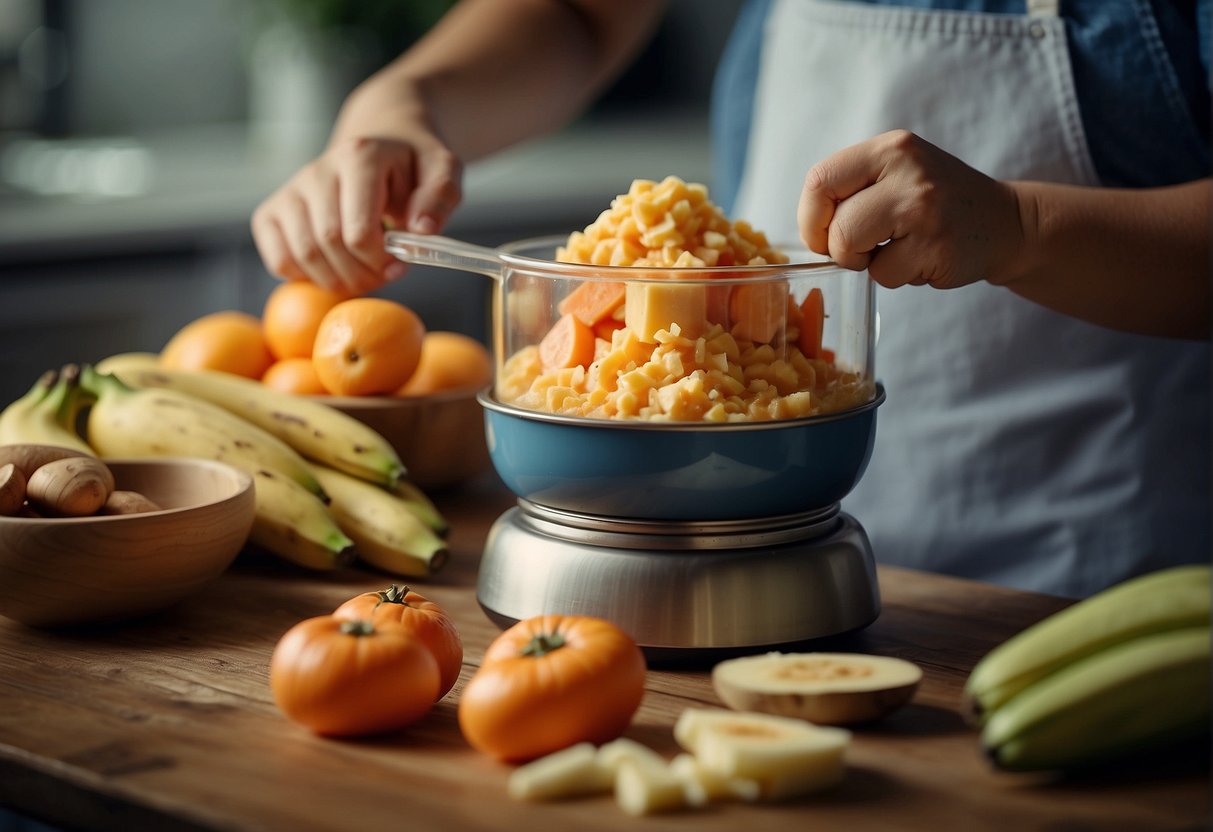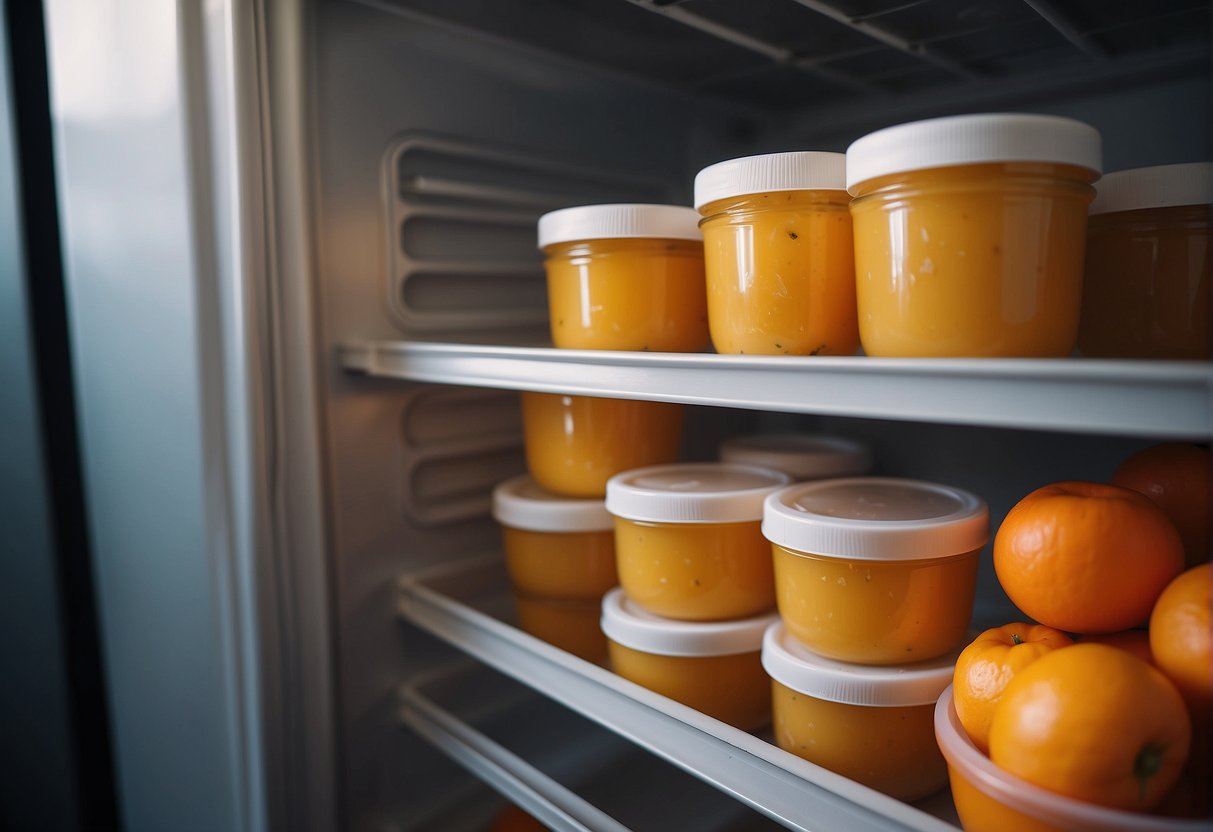Introduction to Banana Carrot Baby Food
When I first started exploring homemade baby food options, banana carrot puree caught my attention for its health benefits and simplicity. Bananas and carrots mash together into a delightful combination that’s not just tasty but also packed with essential nutrients.
Carrots are a fantastic source of vitamin A, which is crucial for eye health, and they provide some fiber as well, aiding in digestion. Bananas bring their own set of benefits to the table, including a good dose of potassium. Plus, they’re naturally sweet, making them a hit with the little ones.
Here’s a quick glance at what these two ingredients offer:
| Nutrient | Benefit |
|---|---|
| Vitamin A | Eye health and immune support |
| Vitamin C | Antioxidant and immune booster |
| Fiber | Digestive health |
| Potassium | Muscle and nerve function |
Together, they create a nutrient-dense meal that supports my baby’s growth and development. The ease of preparation is also a bonus for me—I just steam the carrots and blend them with ripe bananas. It’s reassuring to know exactly what I’m feeding my baby, and preparing it myself makes me feel like I’m doing the best for my little one’s dietary needs.
The combination is not only healthy but also versatile. It can be thinned with breast milk, formula, or water for younger babies or left thicker for older ones who are ready to experiment with textures. With this puree, I introduce my baby to the flavors of real food and the goodness of vitamins C and A, all in one spoonful.
Health Benefits
I’ll guide you through some of the key health benefits of a banana carrot baby food puree. This combo is not only delicious but also packed with essential nutrients.
Nutritional Values
Banana and carrot blend together to offer a nutrient-dense treat for your little one. Bananas are a great source of potassium, which is crucial for heart health and muscle function. They’re also rich in vitamins C and B6. Carrots, on the other hand, are loaded with beta-carotene, which the body converts to vitamin A, vital for eye health. They provide fiber, which can help maintain a healthy digestive system for babies. Together, they make a low-calorie puree that’s naturally sweet and satisfying.
Bananas per 100g:
- Calories: 89
- Protein: 1.1g
- Healthy fats: 0.3g
- Fiber: 2.6g
- Potassium: 358mg
- Vitamin C: 8.7mg
Carrots per 100g:
- Calories: 41
- Protein: 0.9g
- Healthy fats: 0.2g
- Fiber: 2.8g
- Vitamin A: 835µg
- Vitamin C: 5.9mg
Advantages for Babies
Eating banana carrot baby food puree can be pretty beneficial. It’s a soft food, which is ideal for babies who are just starting solids or those who are baby-led weaning. The combination of nutrients supports their growing bones, brain development, and a healthy immune system. Also, as these foods are naturally sweet, they can be more readily accepted by babies.
Considerations for Allergies and Sensitivities
It’s a relief to know that both bananas and carrots are naturally gluten-free and dairy-free, making them suitable for babies with these common sensitivities. Although allergies to bananas and carrots are rare, they can occur. Always keep an eye out for any adverse reactions when introducing new foods to your baby and consult with a pediatrician if you have concerns.
Preparation Methods

When I make banana carrot baby food, I focus on a few key things. First, I ensure all ingredients are fresh to maximize the health benefits. Second, I use precise cooking techniques to retain nutrients, and finally, I aim for a consistency that’s easy for babies to eat. Let’s dive into the preparation methods I use.
Cooking Techniques
For Carrots:
- Wash and Peel: I always start by washing and peeling my carrots to get rid of any dirt and potential pesticides.
- Steaming: I fill a pot with about 1.5 inches of water, bring it to a boil, and then use a steamer to cook the carrots until they’re tender. This usually takes about 12-15 minutes.
For Bananas:
- Peeling: Bananas are simpler; I just peel them.
- Mashing: No cooking needed here, as I can mash them raw with a fork until they’re smooth.
Creating a Smooth Puree
After cooking, I make sure the texture is just right:
- Blending Carrots: Once my carrots are soft, I transfer them to a blender or food processor, adding some of the cooking water to get the desired consistency.
- Combining with Banana: I add the mashed banana into the blender with the carrot puree and mix until thoroughly combined and silky smooth.
Combining Ingredients
Here’s how I combine everything for an ideal meal:
- Mix-ins: If I want to add some variety, I’ll stir in a little bit of oatmeal for texture or an apple slice for a hint of sweetness.
- Fridge Friendly: The puree can be stored in the fridge for a quick, healthy meal. Carrots and bananas are low in salt and rich in fiber and potassium, making them a healthy choice.
I keep an eye on the cook time and the color of the ingredients to ensure I’m giving my little one the best meal possible. No added sugar or salt—just the natural sweetness from the carrots and bananas and the wholesome fiber and calories to support their growth.
Serving and Storage

When I whip up a batch of homemade banana carrot baby food, I focus on serving it fresh and using smart storage techniques to preserve its nutrients and flavor. Let’s get into the best ways to serve this wholesome snack and keep it tasting great over time.
How to Serve
For my little one, I prefer to serve the banana carrot puree at room temperature or slightly warmed. It’s a fantastic meal or snack that fits seamlessly into a baby-led weaning approach or as a smooth transition food for toddlers. I ensure it’s the right consistency by mixing it well and checking for any lumps.
Storing for Freshness
After preparing the puree, I store it in an airtight container with a tight-fitting lid in the fridge. This method keeps it fresh and retains the natural sweetness of the carrots and bananas. I aim to use it within 3 days, as this is when it tastes best and is most nutrient-rich.
Freezing and Reheating
I find that freezing is a convenient way to extend the shelf life of my homemade puree. I pour the mixture into ice cube trays, freeze it overnight, and then transfer the cubes into a freezer bag. Stored this way, the baby food can last for up to 3 months. When it’s time to serve again, I thaw the necessary amount in the fridge and reheat gently in a microwave, ensuring it’s evenly warmed and safe for my baby to eat.
Recipes for Baby Food and Snacks

When I’m looking for snack ideas for little ones, I aim for a blend of simplicity and nutrition. Homemade baby food, like my go-to banana and carrot puree, can be both delicious and healthful.
Simple Banana Carrot Puree
For a wholesome treat that’s easy to make, I whip up a Simple Banana Carrot Puree. Let me walk you through how it’s done with ingredients that offer a powerhouse of nutrients.
Ingredients:
- 1 medium ripe banana
- 2 large carrots, peeled and chopped
Instructions:
Prepare the carrots:
- Add water to a pot until it’s about 1.5 inches deep.
- Bring the water to a boil over high heat.
Steam the carrots:
- Place the carrots in a steamer basket over the boiling water, cover with a lid, and let them steam until tender.
Blend the puree:
- Once the carrots are soft, transfer them to a blender.
- Add the banana to the blender with the carrots.
- Puree the mixture until smooth. If it’s too thick, I add a little water to reach the desired consistency.
Serving and Storage:
- You can serve the puree immediately or let it cool down before giving it to your baby.
- To store, I divide the puree into ice cube trays and freeze. Once frozen, I transfer the cubes to a resealable bag for later use.
Optional Add-ins:
- For a bit of warmth and spice, a pinch of cinnamon can work wonders.
- Sometimes, I’ll mix in a little applesauce or cooked apple for added sweetness and fiber.
This puree doubles as an excellent base for other recipes. I’ve added it to oatmeal for a hearty breakfast or even mixed it into muffin batter. When I bake healthy banana carrot muffins, I use whole wheat flour or substitute gluten-free flour if I’m aiming for a gluten-free treat. I prefer using a muffin pan for regular muffins but occasionally make mini muffins, which are perfect for tiny hands.
Remember, if you’re looking to make these treats a little more exciting for older kids or adults, feel free to fold in some nuts or use the puree as a spread on toast or rice cakes. Just be mindful of potential allergies when introducing nuts to young children.
Frequently Asked Questions
In this section, I’m answering some common questions about banana carrot baby food. These questions are all about making the most of this nutritious combination for your little one, with tips on preparation, variations, and benefits.
What are the benefits of mixing banana and carrot in baby food?
Combining banana and carrot in baby food introduces a balance of sweet and savory flavors, as well as a mix of essential nutrients. Carrots are known for their beta-carotene content, which supports eye health, while bananas bring potassium and fiber to your baby’s diet.
How do you prepare carrot and banana puree for babies?
To prepare carrot and banana puree, start by steaming the carrots until they are soft. Then, blend them with a ripe banana until you get the desired consistency. You can adjust the thickness by adding a bit of breast milk, formula, or water.
What other fruits can be paired with banana for a yummy baby puree?
Aside from carrots, you can mix bananas with a variety of fruits for a delicious puree. Apples, pears, and avocados blend well with bananas, providing different textures and taste profiles for your baby to enjoy.
Are there any nutritional advantages of serving banana baby food?
Bananas are a great food for babies due to their natural sweetness and smooth texture. They’re rich in vitamin C, vitamin B6, and potassium. These nutrients are vital for your baby’s immune system, development, and digestion.
How often can you safely include carrot in your baby’s diet?
You can safely offer carrot to your baby several times a week. Carrots are nutritious and can be started from six months of age. Ensure you prepare them appropriately to minimize choking hazards, and always follow pediatric advice on infant nutrition and feeding frequency.
What are some creative banana puree combinations suitable for babies?
For a fun twist, try blending banana with various fruits and vegetables. Mangoes or peaches can add a tropical flavor, while spinach or sweet potatoes can boost the nutritional content. You can also incorporate grains like cooked quinoa or oatmeal for texture.
